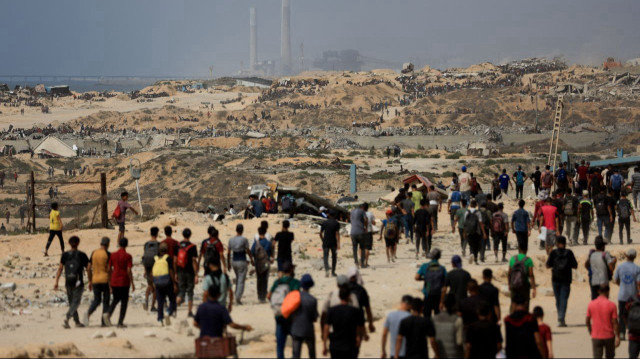
'Now, remembering that the vast majority of children who are severely malnourished will die of another cause -- that they are 10 times more likely to die of pneumonia or measles or something,' says UNICEF spokesperson
UN humanitarian spokesperson Jens Laerke on Tuesday dismissed Israeli Prime Minister Benjamin Netanyahu’s claim that “there is no hunger in Gaza” by referencing a statement from US President Donald Trump.
"I think there's one person I agree with today, and he said that a week ago, and that was President Trump. He said there's real starvation in Gaza. Remember that? I think that's worth remembering," he said at a news conference in Geneva, in response to a question by Anadolu.
Laerke was joined by James Elder, spokesperson for the UN Children’s Fund (UNICEF), who pointed to strong evidence provided by the Integrated Food Security Phase Classification (IPC), which published a report last week that warned that “the worst-case scenario of famine is unfolding in Gaza.”
Elder noted that extensive field data points to a deteriorating humanitarian crisis.
"We've seen a great spike in the number of children who are considered to have starved to death. Now, remembering that the vast majority of children who are severely malnourished will die of another cause -- that they are 10 times more likely to die of pneumonia or measles or something. That is happening and very hard to record those deaths at the moment," he said.
He stressed the importance of “letting the facts on the ground speak for themselves” and drew attention to the humanitarian blockade on Gaza.
"I think it's very important that there is an increasing amount of pressure now from many governments because of the deprivations, nutritional situation we see in children and in mothers and in women, and in the elderly. So the facts speak for themselves," he added.
Israeli Prime Minister Netanyahu last week posted on X that “there is no hunger in Gaza” and “no policy of starvation” being implemented.
- Gaza 'dying of hunger'
Under a tight Israeli siege and constant bombardment, Gaza is facing a worsening humanitarian catastrophe, marked by widespread hunger and severe shortages of water, medicine, medical supplies and hygiene products.
Deaths from hunger, especially among children, are rising steadily.
Local and international groups have repeatedly accused Israel of using “hunger and thirst as weapons of war.”
In addition to the siege, Israel’s military has destroyed an estimated 88% of Gaza’s civilian infrastructure and frequently targets areas where displaced Palestinians have sought shelter.
Out of Gaza’s 2.3 million residents, around 2 million have been displaced by Israeli attacks and evacuation orders, many of them multiple times.
Deprived of necessities, displaced Palestinians are struggling to survive in makeshift tents or overcrowded schools lacking hygiene supplies, functioning toilets and facing outbreaks of infectious diseases.
Meanwhile, Israel continues to carry out daily airstrikes, hitting tents and civilian shelters hosting the displaced.
Since Oct. 7, 2023, at least 60,933 Palestinians have been killed and 150,027 wounded in Israeli attacks on Gaza.







